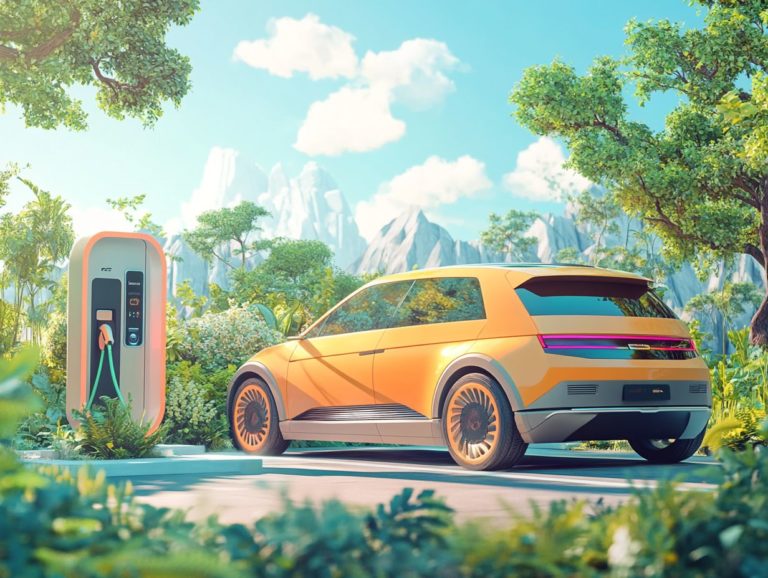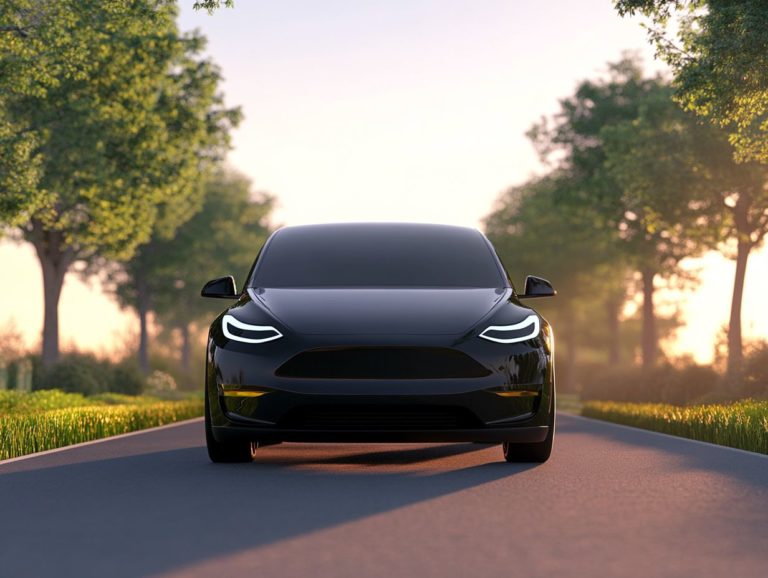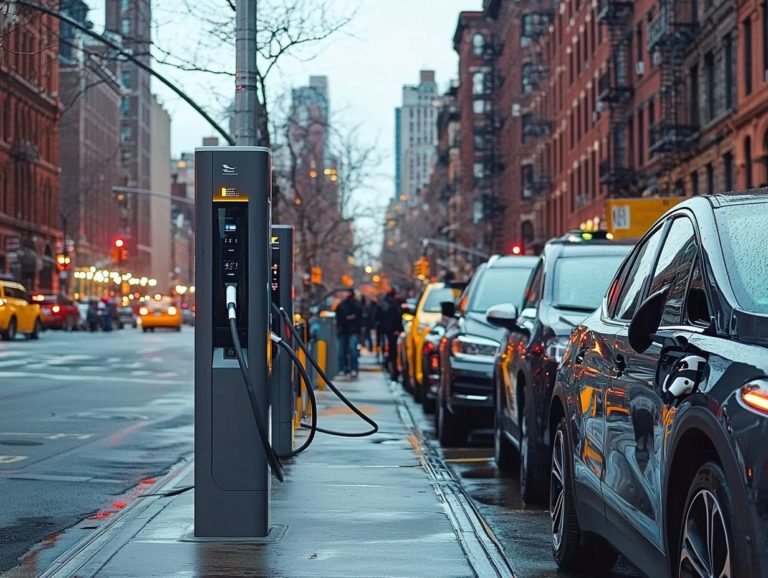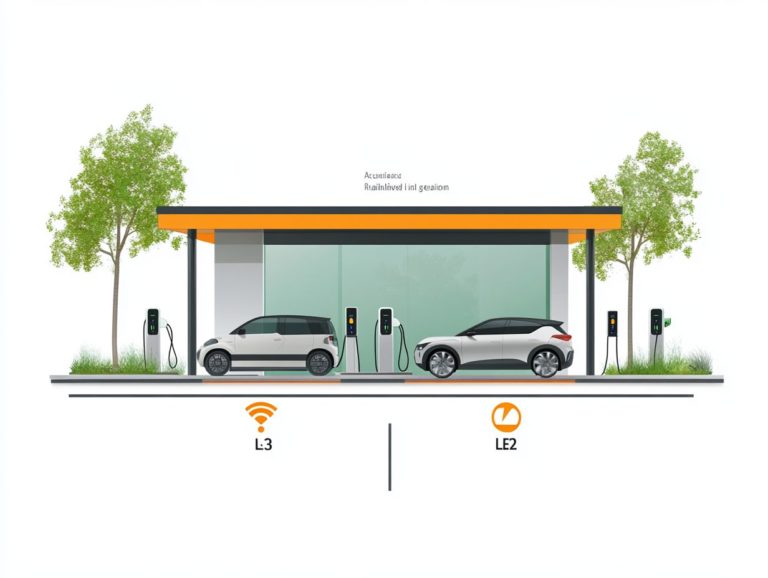Electric Vehicle Maintenance: What to Expect
As electric vehicles (EVs) gain traction in the automotive landscape, it s crucial for you to understand their unique maintenance needs. While EVs require a different level of care compared to traditional vehicles, regular attention to key components will help them perform at their best and enjoy a long life on the road.
Get ready to dive into essential maintenance tasks that will keep your EV running strong! This guide will cover tasks like monitoring battery health and maintaining tire condition, as well as tackling common challenges such as battery degradation and charging issues. You’ll also explore long-term maintenance considerations, empowering you to make informed choices about parts replacements and warranties.
Understanding your EV s maintenance can save you time and money later. Don t wait start today!
Contents
- Key Takeaways:
- Regular Maintenance Tasks
- Common Issues and How to Address Them
- Long-Term Maintenance Considerations
- Frequently Asked Questions
- What is electric vehicle maintenance and why is it important?
- What are some common maintenance tasks for electric vehicles?
- Are there any specific maintenance requirements for electric vehicles compared to traditional gasoline vehicles?
- How often should I take my electric vehicle for maintenance?
- Can I perform electric vehicle maintenance myself or should I go to a professional?
- What are the potential costs of electric vehicle maintenance?
Key Takeaways:
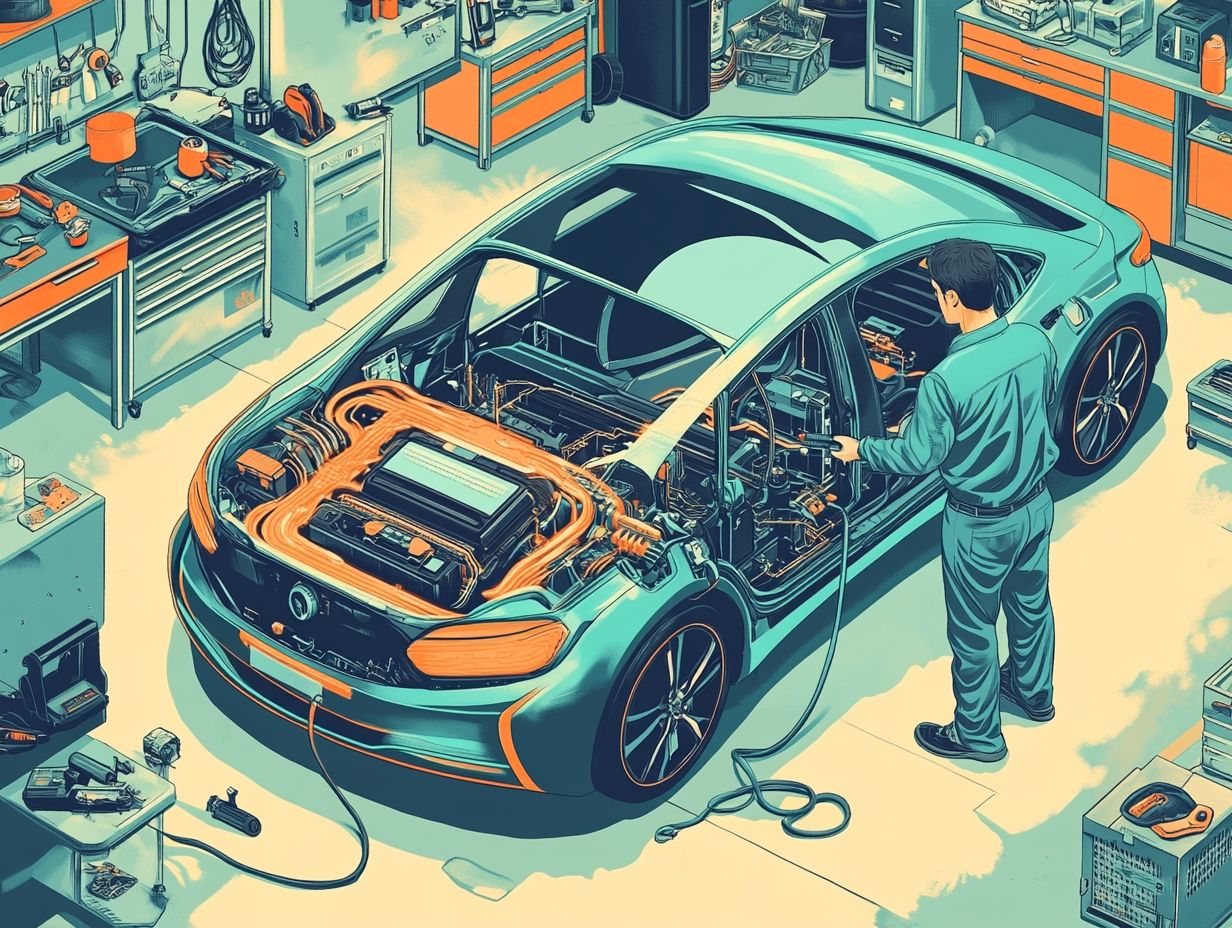
- Regular maintenance is crucial for the longevity and efficiency of electric vehicles. This includes checking battery health, maintaining tires and brakes, and addressing common issues promptly.
- Battery degradation and charging problems are common issues faced by electric car owners. Regular maintenance and proper charging habits can reduce these problems.
- Long-term maintenance for electric vehicles involves replacing parts and considering upgrades, as well as understanding warranty and service options offered by manufacturers.
Why Maintenance is Important for Electric Vehicles
Maintenance is essential for your electric vehicle (EV), as it plays a critical role in operational efficiency, longevity, and safety. Unlike traditional internal combustion engines, electric motors have fewer moving parts, leading to lower maintenance costs.
However, regular upkeep remains vital to ensuring your traction battery operates at its best. By optimizing battery life and energy efficiency, you not only enhance your driving experience but also contribute to the larger vision of electric mobility, championed by industry leaders like Groupe Renault in Europe.
With a well-structured maintenance schedule, you can significantly extend the lifespan of your vehicle’s battery, which is a considerable investment in EV technology. Routine care optimizes energy efficiency, ensuring that crucial components like regenerative braking a system that helps recover energy when you slow down work effectively, reclaiming energy during stops that would otherwise go to waste.
By prioritizing maintenance, you safeguard your vehicle’s operational integrity and enhance safety standards, giving you peace of mind on the road. A proactive approach to upkeep, ideally supported by your local Renault dealer, ensures that every aspect of your electric experience is seamlessly integrated, allowing you to embrace the future of transportation with confidence.
Regular Maintenance Tasks
Regular maintenance tasks for electric vehicles are crucial for ensuring optimal operation and longevity. You should follow a comprehensive maintenance schedule crafted by certified mechanics.
Essential tasks such as tire rotation, brake fluid checks, and air conditioning servicing play a vital role in maintaining both performance and safety. By keeping up with these routines, you’re not just enhancing your vehicle’s performance; you’re also prolonging the life of its mechanical components, especially in models like the Renault ZOE and Twizy.
Battery Health and Charging
Maintaining your battery health and understanding the charging process is essential for anyone who owns an electric vehicle, especially with lithium-ion batteries a common type of rechargeable battery used in modern EVs found in models like the Renault Kangoo Electric. By regularly checking the battery pack and following recommended charging practices, you can prevent common maintenance issues and extend the life of your traction battery, ensuring it performs at its best.
Monitoring your battery health is key to maximizing energy efficiency and enhancing your overall driving experience. Pay attention to factors like regenerative braking it s a game changer for recovering energy during deceleration and can significantly prolong your battery life.
Implementing optimal charging methods is equally important. Avoid extreme temperatures and frequent fast charging to reduce the risk of degradation. By adopting these best practices, you ll not only enjoy a more sustainable and longer-lasting battery but also benefit from reduced costs and improved vehicle reliability.
Tire and Brake Maintenance
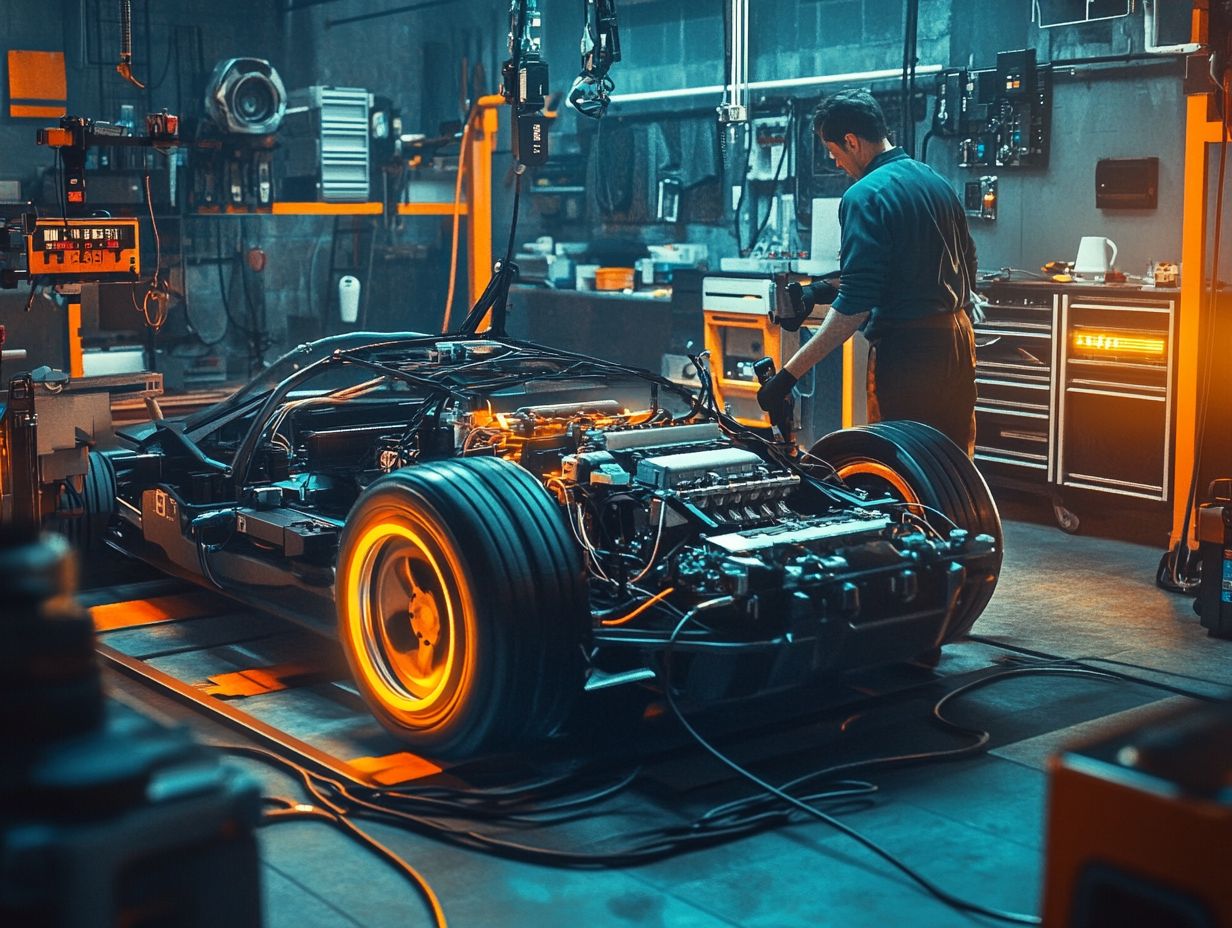
Tire and brake maintenance is paramount for ensuring safety and performance in your electric vehicle. A well-maintained braking system boosts safety. It also cuts down on future maintenance costs.
By regularly rotating your tires, inspecting brake fluid, and having checks conducted by a certified mechanic, you can significantly improve driving efficiency and extend your vehicle’s lifespan.
Neglecting these crucial components can lead to decreased performance and serious safety hazards. For example, tires that are worn unevenly or lack adequate tread can severely compromise traction, especially in adverse weather conditions. If brake pads go unchecked, they can wear down to the point of failure, resulting in longer stopping distances and an increased risk of accidents.
Prioritizing routine inspections helps catch potential issues early, ensuring your tires and brakes are in optimal condition. Act now! This approach boosts your safety and can save you a lot of money over time by preventing costly repairs.
Common Issues and How to Address Them
As an electric vehicle owner, common issues often stem from battery degradation and charging problems. These critical concerns demand your immediate attention and appropriate solutions.
Addressing these challenges head-on can prevent further complications and ensure your vehicle operates efficiently, especially compared to the maintenance hurdles of traditional internal combustion engines.
Dealing with Battery Degradation
Battery degradation is a crucial concern that can significantly impact performance and battery life, especially with lithium-ion batteries the type of battery commonly found in electric vehicles. Understanding the factors that contribute to battery degradation and adopting regular maintenance practices can help you mitigate these effects.
Several factors can influence battery degradation, including temperature fluctuations, charging habits, and the number of charge cycles. Exposing your battery to extreme heat or cold can speed up deterioration. Frequent fast charging can increase wear on the battery.
You could see your driving range drop and performance suffer over time let’s prevent that! To counteract these issues, consider implementing effective techniques such as:
- Monitor battery health using diagnostic tools
- Keep your battery charged; avoid deep discharges
- Maintain optimal charging levels
Regular maintenance checks are essential for keeping tabs on your battery’s condition. This plays a pivotal role in extending the longevity and efficiency of your electric vehicle technology.
Addressing Charging Problems
Addressing charging problems promptly is crucial for maintaining uninterrupted mobility and achieving optimal battery efficiency. Issues like slow charging or complete failure to charge often stem from the charging station, battery health, or even the lithium-ion battery itself. The expertise of a certified mechanic is invaluable for accurate diagnosis and resolution.
Regularly inspect your charging cables and connectors for signs of wear, as damaged components can worsen charging issues. Understanding your charging environment is equally important factors such as temperature and fluctuations in power supply can significantly impact performance.
Stay informed about these factors and schedule routine maintenance checks. By doing so, you can proactively mitigate potential problems before they escalate. Engaging with reputable service providers who specialize in electric vehicles empowers you to unlock the full potential of your car while ensuring its longevity and reliability on the road.
Long-Term Maintenance Considerations
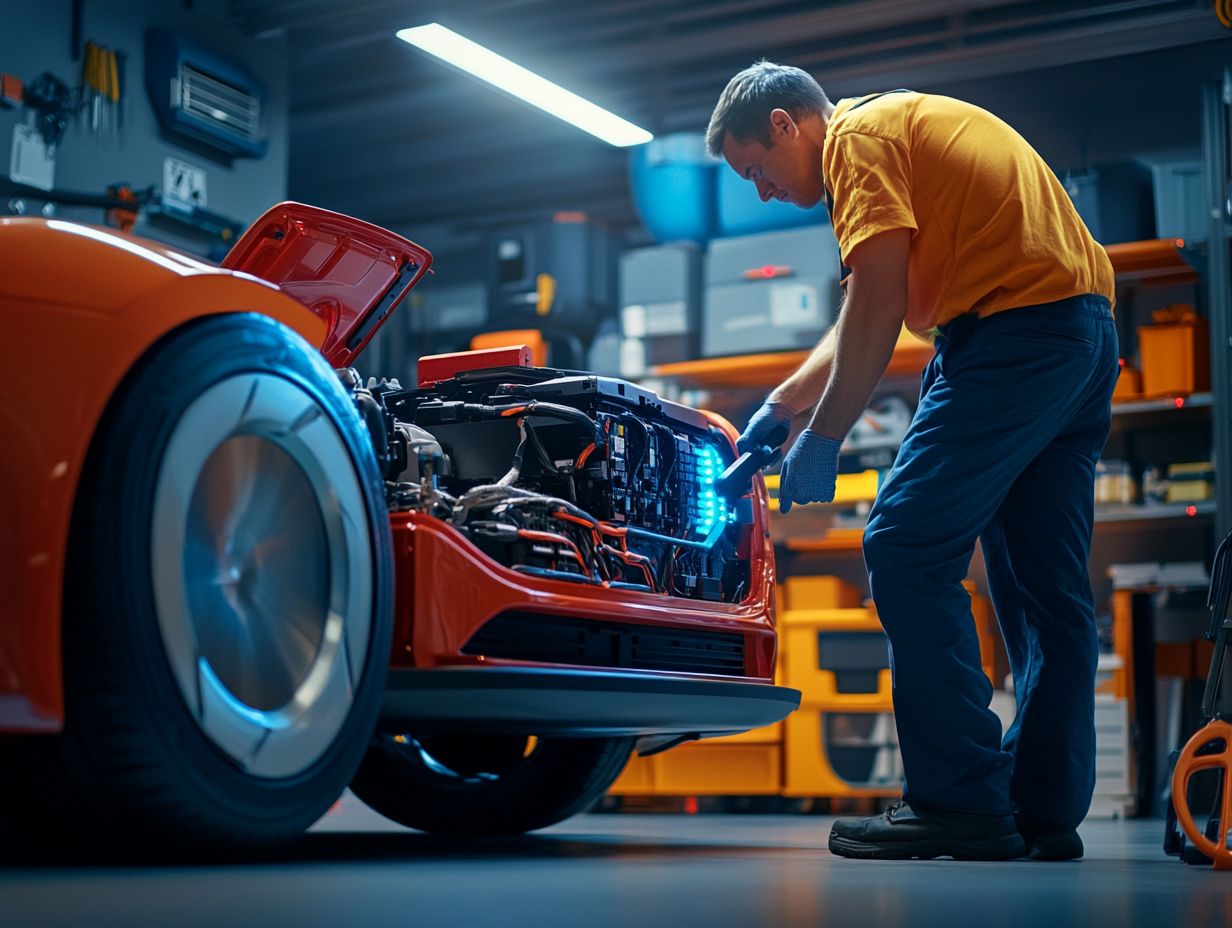
Long-term maintenance for electric vehicles involves more than just routine check-ups; it requires strategic planning for part replacements and potential upgrades. This ensures that your vehicle maintains its efficiency and effectiveness as time goes on.
By familiarizing yourself with service options and warranty coverage, you can significantly enhance your ownership experience, empowering you to make informed decisions about maintenance and enhancements that keep your electric vehicle running at its best.
Replacing Parts and Upgrades
Replacing parts and considering upgrades in electric vehicles is a vital part of your long-term maintenance plan. This enables you to enhance performance and effectively tackle wear and tear.
By enlisting a certified mechanic for these tasks, you ensure that replacements are compatible and meet your vehicle s standards, ultimately boosting its reliability and safety.
Common components that may need replacement include:
- the battery pack
- charging systems
- electric motors
All of these can degrade over time and with usage. Upgrades like high-efficiency batteries, advanced braking systems that help recharge the battery while slowing down, and enhanced thermal management can make a substantial difference in both performance and range.
Regular inspections of your brake systems and tires are crucial for maintaining safety and drivability. Seeking professional help keeps your vehicle in top shape and helps you select upgrades that enhance efficiency and durability, ensuring you maximize your electric investment.
Warranty and Service Options
Understanding warranty and service options is essential for you as an electric vehicle owner. This directly shapes your maintenance strategies and overall ownership experience.
Many electric vehicles come with warranties that cover vital components, such as the battery. This grants you peace of mind while ensuring access to certified mechanics and dealership service options for repairs and maintenance.
Choosing the right warranty can significantly influence your long-term costs and the overall reliability of your vehicle. Options typically range from basic coverage, which might only address defects in materials or workmanship, to comprehensive plans that include battery health and electrical systems.
Don’t miss out on the best warranty for your needs compare your options carefully to determine the best fit for your unique driving habits and concerns.
The impact of your warranty choices extends to service costs and can even affect resale values. Therefore, it’s imperative to thoroughly understand the terms and conditions before making a decision.
Frequently Asked Questions
What is electric vehicle maintenance and why is it important?
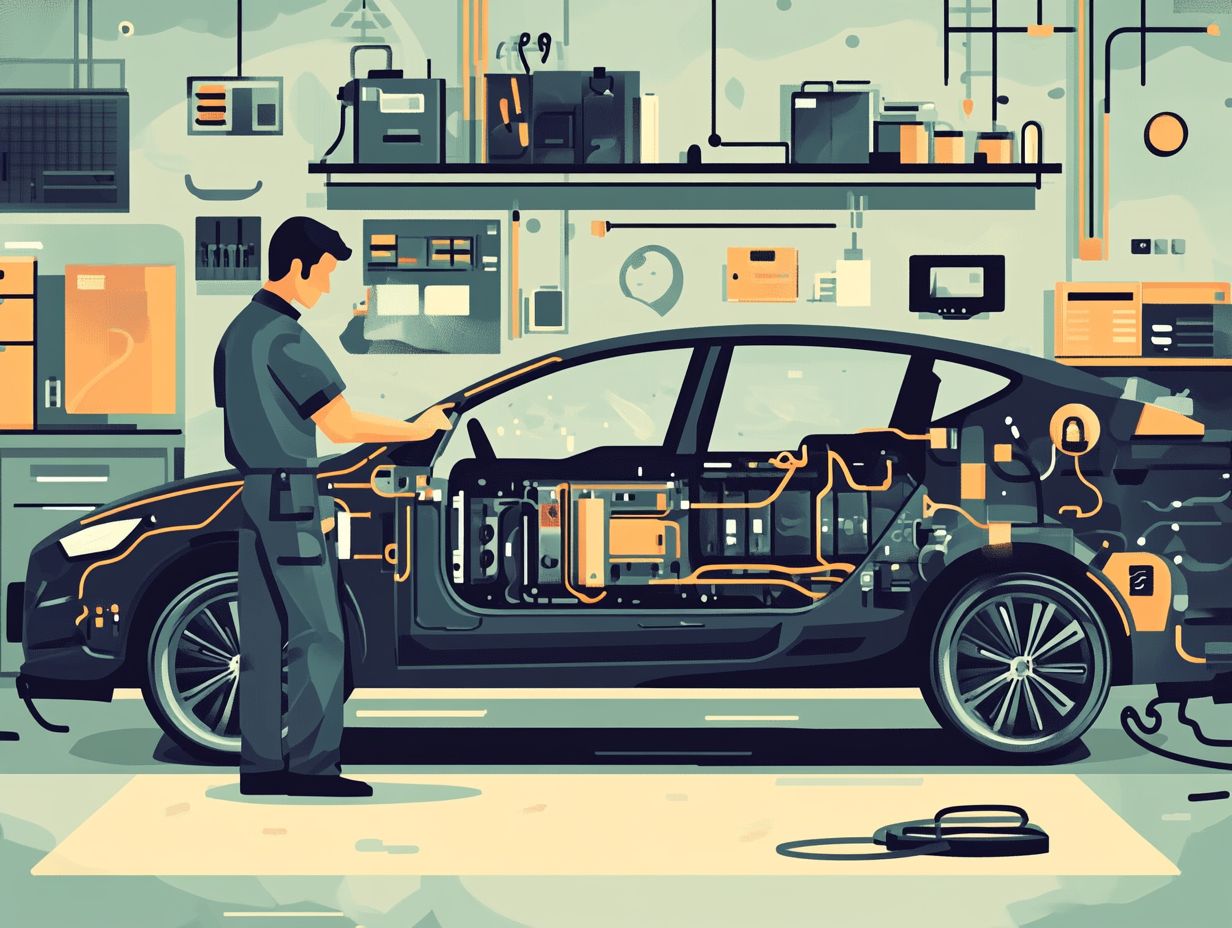
Electric vehicle maintenance refers to the regular upkeep and servicing of an electric vehicle to ensure its optimal performance and longevity. It is important because it helps prevent potential breakdowns and extends the lifespan of the vehicle.
What are some common maintenance tasks for electric vehicles?
Some common maintenance tasks for electric vehicles include checking and maintaining the battery, tires, brakes, and coolant levels. It is also important to regularly clean and inspect the charging port and ensure all connections are secure.
Are there any specific maintenance requirements for electric vehicles compared to traditional gasoline vehicles?
Yes, electric vehicles have a different set of maintenance requirements compared to gasoline vehicles. This includes regular battery checks and replacements, as well as specialized maintenance for electric motor and charging components.
How often should I take my electric vehicle for maintenance?
The frequency of maintenance for electric vehicles varies depending on the manufacturer, but generally, it is recommended to have a maintenance check every 10,000-15,000 miles or once a year, whichever comes first.
For more information or to book your maintenance soon, visit our website!
Can I perform electric vehicle maintenance myself or should I go to a professional?
Some basic maintenance tasks can be done by the owner. For safety and performance, it’s better to have a trained mechanic handle more complicated repairs.
What are the potential costs of electric vehicle maintenance?
The cost of maintaining an electric vehicle can vary. However, you’ll often find that electric vehicles are cheaper to maintain than traditional cars, thanks to fewer moving parts and less need for fluid changes.

